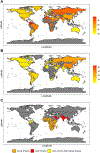Helicobacter pylori infection causes both protective and deleterious effects in human health and disease
- PMID: 34244666
- PMCID: PMC8390445
- DOI: 10.1038/s41435-021-00146-4
Helicobacter pylori infection causes both protective and deleterious effects in human health and disease
Abstract
Infection with Helicobacter pylori (H. pylori) is necessary but not sufficient for the development of gastric cancer, the third leading cause of cancer death globally. H. pylori infection affects over half of people globally; however, it does not affect populations uniformly. H. pylori infection rates are declining in western industrialized countries but are plateauing in developing and newly industrialized countries where gastric cancer is most prevalent. Despite H. pylori infection being the primary causative agent for gastric cancer, H. pylori infection can also cause other effects, detrimental or beneficial, throughout an individual's life, with the beneficial effects often being seen in childhood and the deleterious effects in adulthood. H. pylori is an ancient bacterium and its likelihood of affecting disease or health is dependent on both human and bacterial genetics that have co-evolved over millennia. In this review, we focus on the impact of infection and its genetic bases in different populations and diseases throughout an individual's lifespan, highlighting the benefits of individualized treatment and argue that universal eradication of H. pylori in its host may cause more harm than good for those infected with H. pylori.
© 2021. The Author(s), under exclusive licence to Springer Nature Limited.
Conflict of interest statement
Competing Interests
The authors declare that they have no competing interests.
Figures


References
-
- Bray F, Ferlay J, Soerjomataram I, Siegel RL, Torre LA, Jemal A. Global cancer statistics 2018: GLOBOCAN estimates of incidence and mortality worldwide for 36 cancers in 185 countries. CA Cancer J Clin. 2018;68(6):394–424. - PubMed
-
- Allemani C, Matsuda T, Di Carlo V, Harewood R, Matz M, Niksic M, et al.Global surveillance of trends in cancer survival 2000–14 (CONCORD-3): analysis of individual records for 37 513 025 patients diagnosed with one of 18 cancers from 322 population-based registries in 71 countries. Lancet. 2018;391(10125):1023–75. - PMC - PubMed
-
- Hooi JKY, Lai WY, Ng WK, Suen MMY, Underwood FE, Tanyingoh D, et al.Global Prevalence of Helicobacter pylori Infection: Systematic Review and Meta-Analysis. Gastroenterology. 2017;153(2):420–9. - PubMed
Publication types
MeSH terms
Grants and funding
LinkOut - more resources
Full Text Sources
Medical

